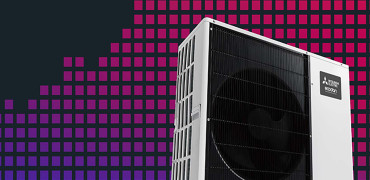As we in the UK continue towards net zero under the latest Government, there are few technologies that have captured our attention as much as the humble heat pump.
Already long utilised and extensively established across Europe, here in the UK heat pumps are slowly but surely becoming a popular and pivotal choice.
Awareness is growing, the technology continues to improve, and energy bills continue to increase, focusing attention on reducing consumption and making this renewable heating solution critical for future years.
We do however have a lot of catching up to do!
Only 5.5% of homeowners heat their homes with a heat pump — among the lowest in Europe
Incentivising the market
Integral for heat pumps of the future is the Government’s Boiler Upgrade scheme (BUS), which is currently under scrutiny and facing speculation ahead of this year’s Budget on November 26th.
This scheme provides upfront grants to help households with the installation of low-carbon heating systems. Both homeowners and small businesses can receive up to £7,500 for installing air source or ground source heat pumps.
This increase from the previous £5,000 level has already led to a noticeable rise in interest, with applications steadily climbing since the adjustment came into effect.
This financial support is complemented by other policy frameworks such as the Future Homes Standard, set to take effect soon, which requires all new build homes to be designed with a low carbon heating structure.
However, these incentives alone won't be the belt and braces needed.
According to Mitsubishi Electric’s “Accelerating the Switch” report, 33% of UK homeowners say they would switch to a heat pump if electricity cost the same as or less than gas. But currently, electricity in the UK is often taxed or levied in ways that makes it more expensive.
At this point in the development of the heat pump market, consistency of policy and long-term government incentives are crucial for the production, training and supply chains for heat pumps. The UK needs to scale up both installations and production if we are to meet our future planet goals.
Heating our home
Heating alone accounts for almost a third of our total greenhouse gas emissions. Reducing this huge figure is essential for meeting our environmental goals.
Heat pumps, using renewable energy sources such as air, the ground or water, generate heat far more efficiently and cleanly than traditional methods. For every unit of electricity consumed, a heat pump can deliver an average of three, four or more units of heat.
When paired with renewable electricity, the carbon footprint of a heat pump system can be almost zero.
Not only do we benefit with carbon savings, but this method of heating helps the nation’s overall energy security, by reducing dependency on imported gas.
So, it would seem to be a ‘no brainer’ ... Yet research for the “Accelerating the Switch” Report, found that while 80% of UK homeowners say they care about climate change, only 6% have already switched to heat pumps.
The huge chasm between our desire to be green and our reluctance to switch, stems from installation costs, running-cost concerns, and infrastructure readiness.
The retrofit challenge
Embracing heat pumps in new builds is relatively straightforward, but retrofitting our vast stock of existing houses represents one of the largest technical challenges. Many homes are older, have poor insulation, small radiators and electrical systems designed for gas boilers — all of which reduce the efficiency and comfort of heat-pump systems unless addressed.
Retrofitting our homes is a huge hurdle, many of our homes were built long before modern systems existed. This is where modern, high temperature heat pumps can help as they can directly replace existing gas boilers – although the efficiency can and should be increased with better insultation and draft reduction.
Older homes, especially dating back to the 18th century have solid stone or brick walls with no cavity, windows are single glazed and chimneys are open. As with all homes and heating systems, much of the heat is lost through walls, roofs, and windows. This can make heat pump performance less effective.
Many industry groups are calling for a whole home retrofit incentive scheme which would encourage an approach to allow insulation and heating upgrades to go hand in hand. This not only ensures the best performance from the technology but also maximises the carbon savings achieved. A co-ordinated approach will be the key to moving forward with the heat pump revolution.
To overcome these retrofit barriers, the industry is calling for:
- Improved insulation and whole-home upgrades (not just heating systems),
- Larger or different heat-distribution systems (e.g., oversized radiators, underfloor heating) to match lower-temperature flows from heat pumps
- Upgraded electrical supply in some cases (e.g., to handle higher loads or control systems)
- Coordinated installer training and support, including supply chain readiness.
A heat pump engineer on every corner
The heat pump industry is growing at pace but can supply chain and workforce availability keep up with demand?
The Heat Pump Association (HPA) has estimated that we will need tens of thousands of trained engineers if we are to meet our targets.
However, the report from Mitsubishi Electric does show that existing heating installers consider themselves fully ready to switch to renewable heating, with 93% of residential and commercial installers skilled and experienced to fulfil these targets.
Training initiatives are being rolled out across the country. Local colleges, manufacturers and trade bodies are developing consistent standards and quality assurances which are essential for maintaining public confidence.
Growing the momentum
In order for the UK to meet its target figure of 600,000 annual heat-pump installations by 2028 momentum is crucial.
Consistency and stability in Government policy, along with a continued investment in skills, and a spotlight on retrofitting are all key to growing the market.
As we progress towards a cleaner energy future with a resilient energy system, heat pumps will be a defining feature in all our homes. Their ability to deliver efficient, low-carbon heating makes them fundamental to our net zero targets.
Heat pumps are poised to move from niche to mainstream, helping homes to become warmer and more energy efficient, and allowing the UK to take a crucial step in its path towards reducing the harmful impact of climate change.
Kirsty Hammond is Publisher and editor of Specifier Review




